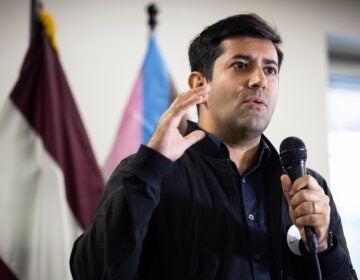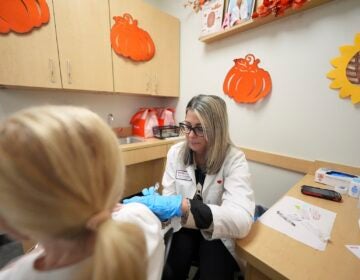I want to travel outside the U.S. Are there still COVID-19 restrictions?
Much of the world is open to Americans, particularly vaccinated travelers, but the rules vary. Here’s what you need to know before you go.
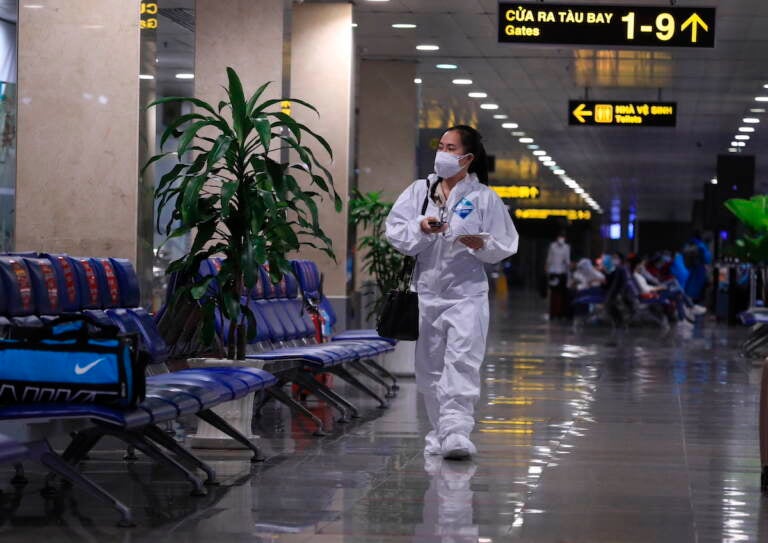
A passenger in full protective suit walks to boarding gate at Tan Son Nhat airport in Ho Chi Minh city, Vietnam on 15 Oct. 2021. Vietnam has resumed air travel after several months of suspension due to COVID-19 outbreak. (AP Photo/Hau Dinh)
Ask us about COVID-19: What questions do you have about the coronavirus and vaccines?
This is one of a series of articles in which reporters from WHYY’s Health Desk Help Desk answer questions about vaccines and COVID-19 submitted by you, our audience.
Travel restrictions have changed often through the pandemic, as mutations evolved and case numbers fluctuated. Much of the world is now open to travelers from the United States, but with various limitations — some countries are closed to visitors completely.
Last week, the Biden administration announced that the U.S. will open its land borders with Canada and Mexico in November. Foreign travelers from any nation also are allowed into the U.S. if they can show proof of vaccination.
With the holidays ahead, more and more people are choosing their destinations and planning their itineraries.
“The pent-up demand for travel is overwhelming,” said travel agent Tee McNeill, of McNeill Luxury Travel.
“I have never seen anything like this in this industry. And I think anyone who thought travel was dead as a result of COVID-19 was totally fooling themselves,” McNeill said. “People are ready to go, and what they need to know is where they can go, and what are the protocols for getting there, and what kind of experience they can expect to have.”
Travel agent Ian Swain, of Swain Destinations in Ardmore, said his company is seeing similar demand.
“We’re getting a lot of inquiries … People are wanting longer trips to spend more time with their families. We do a lot of multigenerational family travel, and there’s a lot of that going on right now,” he said.
Before March 2020, Swain’s company focused on Australia, New Zealand, Africa, and Asia. Australia and New Zealand are closed to travel currently, he said, but countries in Africa have been popular, and since Europe has opened, people are interested in visiting that continent as well.
“Now is a great time to travel to a lot of destinations because it’s a little quieter than normal. For example, Europe is quieter now, they’ve just recently opened up. There hasn’t been an influx of tourists that normally happens in the summer in Europe,” he said.
“South and East Africa, we’re finding people are going there because it is open spaces, they don’t have to wear masks, and they can get out in nature and see the animals,” Swain added. “When you go into the cities, of course, you’ve got a different scenario. Some cities require masks, some don’t. It’s a combination of a lot of different aspects … if you speak to an expert about it they can give you the exact advice and you can make the right decision as to what’s best for you right now.”
Ready to take that trip? WHYY’s Health Desk Help Desk consulted with the State Department and some U.S. embassies overseas to find out what you need to know before you go — though, as has happened in the past, situations may change.
What does the CDC say?
The Centers for Disease Control and Prevention recommends that people avoid traveling until they are fully vaccinated and understand airline and destination protocols, such as vaccination, masking and social distancing requirements, before booking. Travelers should wear masks when in close contact with unvaccinated people, and when in crowded outdoor areas, the CDC advises. Fully vaccinated travellers must still get tested for COVID-19 when returning to the U.S.
The agency advises against unvaccinated people traveling. But if they must travel, the CDC says, they should research their destinations’ safety requirements, get tested before leaving the U.S. and upon returning, and wear masks at their destinations.
Where can I go if I’m vaccinated?
Many countries in Africa are open to travelers from the United States as long as they show proof of negative COVID-19 tests. Requirements vary country to country, however, so experts say it’s important to research before you book. And Madagascar is not open for travel at all, according to the U.S. embassy there.
Many countries in Europe are accepting vaccinated travelers from the United States. Those countries still have various testing and/or quarantine requirements, however. Again, experts advise travelers to research each country’s requirements before booking. Luxembourg, Norway, and Sweden are closed entirely to U.S. travelers, according to the U.S. embassies there.
Canada is open to vaccinated Americans if they have proof of vaccination or proof they recovered from COVID-19. Visitors must also show proof of negative COVID-19 tests.
Many South American countries are accepting vaccinated travelers from the U.S., but with varying testing and/or quarantine requirements. If you visit Panama, for example, and receive a negative COVID-19 test result, you can move freely. But other countries have stricter requirements. Chile requires visitors to have travel medical insurance that covers at least $30,000. Also required is a “mobility pass” that can take up to two weeks to receive, and individuals are required to quarantine for five days. That’s why advance research is important for travellers before booking a trip, experts say. Argentina still bans all visitors from the U.S., but will open up travel in November.
Countries in Asia have had the most strict COVID-19 requirements, but some of those are loosening. Fully vaccinated Americans can now visit select areas of Thailand without having to quarantine, while other areas still have quarantine requirements in place. Travelers must show negative COVID-19 test results taken within three days of arrival and have travel health insurance with a minimum $100,000 of coverage that includes COVID-19.
Fully vaccinated Americans may also visit Singapore if they take two COVID-19 tests 48 hours before departure and again upon arrival. Other parts of Asia will soon follow suit. Vietnam, for example, will start opening limited travel in the next few weeks.
Americans wanting to visit Australia and New Zealand must keep waiting.
What if I’m not vaccinated?
Some countries do accept unvaccinated travelers, but most have testing requirements, and many have quarantine restrictions.
Several countries in Africa, including Egypt, Nigeria, and South Africa, accept unvaccinated visitors from the United States as long as they show proof of negative COVID-19 tests. Some countries have long quarantine requirements. If you’re unvaccinated and visiting Tunisia, for example, you must be quarantined for 10 days.
A limited number of European countries also welcome unvaccinated travelers from the United States. Allowing unvaccinated visitors, if they get tested, are Croatia, Greece, and Portugal.
Countries within the U.K, as well as Ireland, Italy, Iceland, and Austria, are among those that accept unvaccinated travelers from the U.S. if they quarantine for several days — 14 in many locations. If you have proof of recovery from COVID-19, you can skip quarantine in many of those countries.
In South America, some countries such as Brazil allow unvaccinated travelers from the United States if they test negative for COVID-19. Colombia and Mexico have no restrictions. Mexico has been a popular travel destination for that reason, McNeill said.
If you’re not vaccinated, it’s important to respect the health and safety of other people when in public, she said.
“Wear a mask, do not put yourself at risk, and more importantly, do not put other people at risk even if you haven’t gotten sick,” McNeill said. “You don’t know, you could be a carrier. And these days, with all these new strains coming up, you could literally hurt other people. So if you are unvaccinated and you don’t have any plans to be vaccinated, have the courtesy of traveling smartly, and wear a mask, it’s the least you can do. But I think you can have a good experience as long as you are respectful of those health and safety protocols that are in place set by the receiving country or the receiving location.”
What requirements should I expect?
Tourists should research their destinations’ requirements, which could range from getting tested for COVID-19, quarantine, travel health insurance, or other documentation.
“Certain borders and certain countries are closed, and there’s protocols in the countries that are open, and the protocols are very different in each country, in each destination, and you just have to be aware of what they are so you’re prepared,” Swain said.
Some basic information applies in many places, however.
“Most countries are accepting vaccinated travelers, and they need to have a negative PCR test taken within 72 hours of their departure flight from the U.S. to the first port of call. There are some countries in Europe and Africa that require you to have a COVID test, which could be a PCR test or an antigen test on arrival. And there are other countries that allow you to travel throughout the country provided you’ve had no COVID and got the vaccination before you arrive. Then you need to have a test before you leave within 72 hours to return back to the USA, [then] you get entry into the States,” Swain said.
“If you’re traveling internationally and you’re traveling between countries, for example, let’s take an African trip and you’re traveling to South Africa, Botswana, and Zambia, you need to have COVID tests at each time you cross the border. But the travel companies will help arrange that. In Africa, particularly in East Africa and South Africa, they will arrange for the testing to be done in the lodging that you’re staying at. And there are some countries that have the testing available right at the airport before you go and have instant tests, 15, 20 minutes wait, and then you’re cleared to go.”
Travelers should also research what they’ll be able to do once they arrive.
“In the past before COVID, you could go to a country and you had carte blanche, you could go anywhere you wanted, you could do things, eat anything you want. But now, as a result of COVID, the travel experience has changed,” McNeill said.
“New York, where you need to have a vaccine in order to go to a restaurant or to a hotel, go to a Broadway show, and those are things that people are going to be doing on vacation. But a lot of places have requirements where they want you to wear a mask. I think everybody knows right now that cruises, if you want to go on a cruise, you have to be vaccinated. There is no exception to that. But then what about places where you’re unvaccinated? Do you need just a COVID test? Do you need to quarantine?”
“But then on the flip side, you can have an extraordinary experience because there’s nobody at the Colosseum,” she added with a laugh. “You might be able to see the Mona Lisa without all of the cameras and tripods and selfie sticks.”
Expect protocols to change, McNeill said.
“Turks and Caicos, all you needed was a negative COVID test to enter. But now, you have to be vaccinated, and that changed. So if you had been to Turks back in May and you’re thinking you’re coming back for Christmas or something, well, guess what, you’re going to need a vaccine in order to get in,” she said. “So that’s what I mean when I say things change, and they change fairly quickly.”
It’s important to check restrictions within the United States too.
“I’m currently booking a trip to New York. It’s a last-minute trip for Christmas, and my clients didn’t know that in order to go to New York and have a good time, to go to restaurants and hotels, shows, anything of that nature that is public, they have to be vaccinated. People don’t know that, and they think New York is playing, and they’re not,” she said.
McNeill warned that researching a destination’s restrictions is difficult because the language can be very technical and cities might have restrictions separate from the state or country in which they’re located.
But if you don’t do your research, it can be risky.
“It’s terrifying, because honestly you could have spent all this money on your flight and your hotel and you get to the airport and you don’t have the documentation that you need, you haven’t had a COVID test, for example. Let’s say the location requires you to have a negative COVID test. Well, the airline is aware of this, and they will not let you board your flight. So then what happens? Everything after that falls apart. It’s like a domino effect,” McNeill said.
“And if you don’t have travel insurance, I hate to say it, but you are going to lose your travel investment. And for some people, that can be devastating because they saved all this money in the last year, and now they’re trying to spend it, and if you lose that, it’s gone.”
She recommends that travelers also try to ensure their destinations won’t be overly crowded, and that there will be plenty of activities to do in open spaces. And if you want to travel during the holidays in 2022, book now, McNeill said.
“If you’re trying to travel during the holidays this year, you’re about a year too late. Festive … that’s what we call Christmas and New Year .. festive has been sold out since around March,” she said.

Get daily updates from WHYY News!
WHYY is your source for fact-based, in-depth journalism and information. As a nonprofit organization, we rely on financial support from readers like you. Please give today.



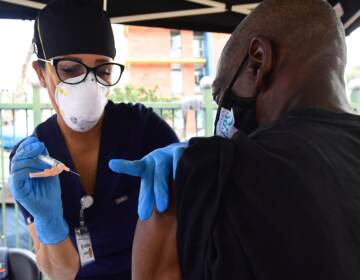
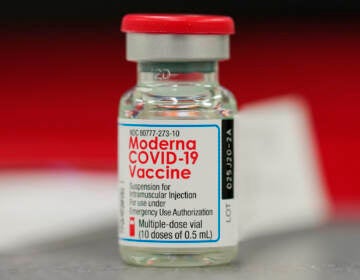
![CoronavirusPandemic_1024x512[1]](https://whyy.org/wp-content/uploads/2020/03/CoronavirusPandemic_1024x5121-300x150.jpg)

